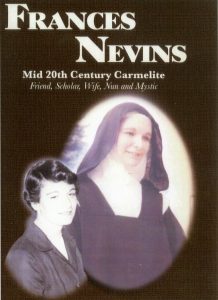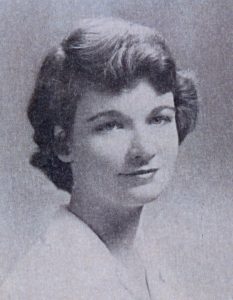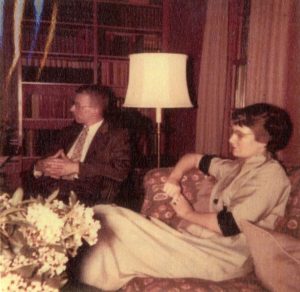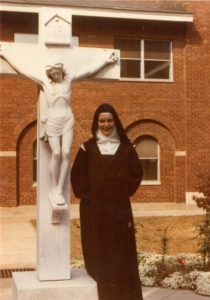
Our guest blogger is Sarah Zentner, a doctoral student in English at the Catholic University of America. She is researching the sacramental imagination in 19th-century British and American fiction, as well as the best chai tea latte in Washington, D.C.
Good news for first-year students (and upperclassmen, graduate students, and faculty) who feel they don’t have their lives “figured out” just yet: you’re in good company. Frances Nevins (1930-1980), later known as Sr. Christine Marie of the Holy Spirit, OCD, lived several callings during her short life: gifted academic, loving wife, and finally, Carmelite nun.
After Nevins’ death in December 1980, her longtime friend Joan Ward Mullaney, former Catholic University professor and Dean of the National Catholic School of Social Service, began gathering materials for a biography. But her quest to tell the story of Frances’ life didn’t end with the book’s publication in 2009. In August 2012, on the strength of the numerous personal testimonies, documents, correspondence, and spiritual writings she’d spent the last three decades collecting, Mullaney formally opened the petition for Frances Nevins’ beatification and canonization in the Catholic Church.

In this blog, we offer a brief sketch of the “very unusual holy person” that was Frances Nevins, as an encouragement for all those who don’t know what they want to be when they grow up.
Gifted Academic
Nevins graduated from Connecticut College for Women in 1951. Professor Edward Cranz, who supervised her honors thesis on Nicholas of Cusa, called her “the most brilliant student I encountered in a lifetime of teaching,” while the former president of the American Cusanus Society, Gerald Christianson, declared her “clearly gifted” and apt for academic life. After earning her master’s degree in 1952 from Radcliffe College at Harvard, however, Nevins ceased her academic pursuits.
Loving Wife

Frances Nevins married Paul Cawein in an Episcopal ceremony in 1953. In a 1954 letter to friend Joy Nicholson, Paul writes that “…we are very happy. I just read back over the letter you sent to me before our wedding telling me of the fine wife I was getting. When I read it the first time, I thought that you were right, but now I can only say amen.” Shortly after their marriage, however, Frances claimed the Catholic faith in which she was baptized, while Paul refused to have their marriage blessed in the Church and would not agree to raise their future children as Catholics. Citing their “irreconcilable” religious differences, the couple split in 1955. Frances sought (and was granted) a divorce and an annulment in 1958.
Carmelite Nun

Drawn more and more to the Catholic faith, Frances felt a spiritual calling to consecrate her life to God after her divorce. Thinking at first that she wanted to use her intellectual gifts in the service of others, she sought admission to the Sisters of the Good Shepherd in New York, but soon realized she preferred a contemplative vocation to an active one. She entered the Schenectady Carmel in 1960 and professed her final vows in October 1965. For the next fifteen years, she lived a quiet life dedicated to prayer and the service of her community. She died on December 16, 1980, leaving behind a trove of spiritual writings that attest to a life of great virtue and love.
It may be many years before Frances Nevins is declared a Catholic saint, but in the meantime, she is a kind of “patron” for everyone who feels discouraged by a future that seems unclear, and an inspiration to those of us who still aren’t sure of what we’re called to do with our lives.
For more information, or to learn more about how to access the Frances Nevins collection, please email Special Collections at lib-archives@cua.edu.
